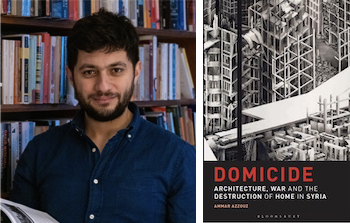New book unveils the connections between the built environment, the creation and destruction of 'home', and war in Syria

Dr Ammar Azzouz, a British-Syrian architect and British Academy Research Fellow in the School of Geography and Environment, is author of the new book 'Domicide: Architecture, War and the Destruction of Home in Syria'.
Written by Aissa Dearing
In Domicide: Architecture, War and the Destruction of Home in Syria, Dr Azzouz, not only humanizes the conflict from the positionality as a member of the Syrian diaspora, but he also brings to light an even greater violence that occurs in wartime Syria -- domicide -- the intentional destruction of home and its memory as a weapon of war.
Based on interviews with those working in the built environment professions, both inside and outside of Syria, but also Syrians from other backgrounds who have become 'architects' in their own way as they were forced to repair and rebuild their homes by themselves, Domicide offers fresh insight into the role of the architect during time of war, and explores how the future reconstruction of cities should mirror the wants and needs, the traditions and ways of living, of local communities.
In the foreword of the book, Lyse Doucet, the BBC's Chief International Correspondent, wrote that "combined with the ability to stand back with a scholar's skills, and dig deeper with a researcher's rigour, books like Azzouz's can help us reach a new understanding of what is, arguably, one of the most evocative, most important, words in the English language: home. Its meaning matters to all of us - especially when it is ripped away."
Giving a name to the action of the deliberate destruction of home, domicide, helps not only to responsibilize wartime actors of committing this intentional form of violence, but it also helps to understand how redevelopment and gentrification act as violence during peacetime.
As Dr Azzouz outlines in his book: “the bodies and experiences are seen as irrelevant, and land becomes more valuable than the people who live on it.”
Human struggles and systems of oppression are often seen as removed from urban studies and architecture. But in fact, as we know, the placement and destruction of infrastructure is inherently political. In his latest book, Dr Azzouz gives the example of walls for defense as 'conflict infrastructure' that have displaced and disconnected communities that surround them.
The city of Homs, like so many places in Syria, has suffered mass destruction since the war began in 2011. So far, the architectural response to the crisis has focused on 'cultural heritage', ancient architecture, and the external displacement of refugees, often neglecting the everyday lives of Syrians and the buildings that make up their homes and communities. In Domicide, Ammar Azzouz uses the notion of the 'home' to address the destruction in cities like Homs, the displacement of Syrian people both externally and internally, and to explore how cities can be rebuilt without causing further damage to the communities that live there.
Focusing on Homs but offering a blueprint for other urban areas of conflict across Syria and the wider world, the book is essential reading for researchers in architecture, urban planning, heritage studies and conflict studies. Its work transcends geographies and time.

For more information and to purchase, please visit the publisher's website.
 Aissa Dearing (they/she) is a current Environmental Change and Management student from Durham, North Carolina, USA. Her research interests lie at the nexus of political theory, sustainable development, food systems transformation, and greenhouse gas emissions reductions. Aissa has a breadth of multi-sector experience, most notably working in the Biden-Harris White House, philanthropy, Durham-based non-profits, climate journalism, and environmental justice policy development. She will continue her research this year as a DPhil in Geography and the Environment with a Clarendon Scholarship.
Aissa Dearing (they/she) is a current Environmental Change and Management student from Durham, North Carolina, USA. Her research interests lie at the nexus of political theory, sustainable development, food systems transformation, and greenhouse gas emissions reductions. Aissa has a breadth of multi-sector experience, most notably working in the Biden-Harris White House, philanthropy, Durham-based non-profits, climate journalism, and environmental justice policy development. She will continue her research this year as a DPhil in Geography and the Environment with a Clarendon Scholarship.
New book unveils the connections between the built environment, the creation and destruction of 'home', and war in Syria
Dr Ammar Azzouz, a British-Syrian architect and British Academy Research Fellow in the School of Geography and Environment, is author of the new book 'Domicide: Architecture, War and the Destruction of Home in Syria'.





